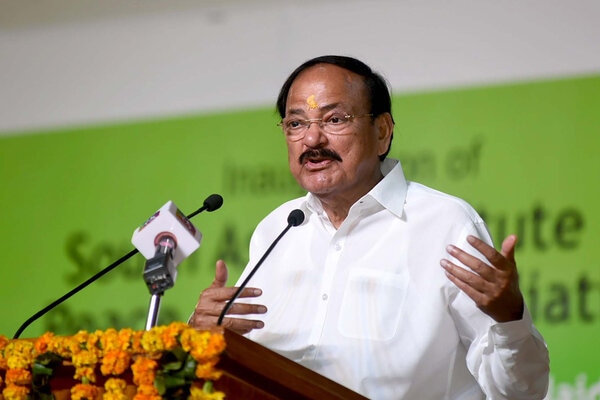Vice President, M. Venkaiah Naidu called for restoring India’s glorious tradition in the education sector by revisiting ancient teaching-learning systems and traditional knowledge to make them relevant to the present times..
Addressing the gathering after inaugurating the South Asia Institute of Peace and Reconciliation (SAIPR) in Haridwar, he lamented that India’s famed, age-old education system was severely dented by centuries of foreign rule.
He said that prolonged colonial rule deprived large sections, including women of education and only a small elite class had access to formal education. “It is necessary to provide quality education to all, only then can our education be inclusive and democratic,” he said.
Naidu also expressed his happiness over National Education Policy’s attempt to Indianise our education system and expressed strong disapproval of the mentality that considers everything Indian as inferior.
Emphasizing the need to re-connect with our roots, the Vice President wanted the family elders to spend more time with the young children so that the latter can better imbibe our rich cultural values and traditions. He also advised the youngsters to spend time with nature and called it as the best teacher.
Stressing the importance of mother tongue in our lives, the Vice President exhorted the youth to practice, propagate and promote their mother tongues. “I would like to see a day when Indians talk to their fellow countrymen in their mother tongue, administration is run in mother tongue and all government orders are issued in people’s language,” Naidu said. He also called for use of local languages in court proceedings.
With social and other tensions on the rise in the strife-torn world, the Vice President said that peace is a prerequisite for humanity’s progress. “Peace has a cascading effect—it engenders social harmony and paves the path for progress and prosperity,” he said, underlining that the ‘dividend of peace’ benefits every stakeholder and brings wealth and happiness to the society.
Noting that South Asian countries share common history and civilization, he also called for respecting the linguistic, ethnic and cultural diversities in the region, which showcase the core values of tolerance and peaceful coexistence. “As the ‘spiritual capital’ of the world, India will continue to play its part in maintaining peace and ensuring harmony,” he added.



